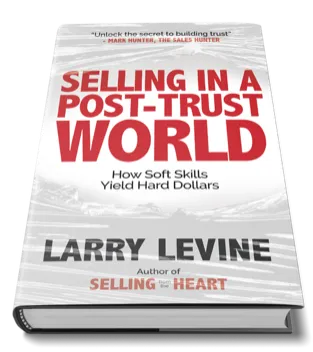
Unlocking Your Sales Engine... Why CEOs Must Understand What Makes Their Salespeople Tick.
"The more you understand, the less you need to explain."
Jim Rohn
As you reflect upon this quote, I ask you to think about your salespeople... What makes them tick? What do you really know about them? More importantly, what are they capable of accomplishing above and beyond what they're doing?
The more you know, the more your sales grow. The more you know about your team, the less you need to explain to others.
When executives truly understand their salespeople, their motivations, challenges, and client interactions, they don’t need to micromanage or over-explain strategies.
The better executives understand their sales team, the more naturally aligned their guidance becomes.
When executives equip their sales team with clarity and not clutter, this starts to reduce the need for lengthy explanations.
When executives understand their sales team’s perspective, they can communicate in ways that resonate. They soon find themselves not needing to repeat themselves or justify decisions.
The more your sales team feels understood, the more confident and autonomous they become. Plain and simple, understanding creates empowerment.
"You can only understand people if you feel them in yourself."
John Steinbeck
Today’s business climate is rapidly changing, CEOs and Presidents are facing mounting pressure to drive growth, enhance client engagement, and align their organizations for long-term success.
Amid all these strategies, technologies, and market shifts, many overlook a fundamental lever of growth, truly understanding what makes their salespeople tick.
When you, as the CEO or President, deeply grasp what drives your salespeople, their motivations, strengths, and hidden potential, you unlock not just individual performance, but also collective excellence.
Alignment starts with knowing your people.
In our time together, we’ll explore why it’s mission critical for executives to understand their sales teams. You will be provided with three key insights to unlock potential, and a practical outline you can put into action.
We’ll round things out with a call to action designed to challenge your thinking and drive meaningful change.
Are you ready? Say, "I'm Ready!"
Why CEOs Must Get to Know Their Sales Teams
Just saying... There are those CEOs who focus on the numbers, the forecast, the pipeline, the quarterly targets, all without investing enough time in understanding the people behind those numbers.
Here’s the truth, salespeople are not just producers; they’re the lifeblood of your revenue growth engine. Ignore them, and you're driving blind.
In Selling from the Heart, I talk about the power of showing up with authenticity. When your people feel seen, heard, and valued, they sell with heart. And heart builds trust.
And trust? That’s what wins deals.
No trust, no traction. No connection, no commitment. You can have the best strategy in the world, but if your sales team doesn’t trust leadership, it all falls apart from the inside out.
If you’re not investing the time to understand what drives your salespeople, their fears, hopes, and hidden strengths, you’re not just leaving money on the table. You’re burning out your best talent and wondering why turnover is eating your margins.
Salespeople don’t leave companies. They leave leaders who never really knew them.
Key Points to Unlock Your Sales Team’s Potential
1. Salespeople Crave Purpose, Not Just Paychecks
A good base, bonus, and commissions matter. But if you think compensation alone will keep your sales team motivated, you’re missing the bigger picture. Today’s top performers are increasingly driven by purpose.
It's the desire to do work that matters, to serve clients in meaningful ways, and to be part of something bigger than a number on a spreadsheet.
The secret to unlocking high performance lies in tapping into the inner motivations of your salespeople. The best sales leaders don’t just manage pipelines; they connect their team’s daily actions to a deeper mission.
Your action plan:
Conduct regular 1:1s that go beyond performance reviews. Be brave, be courageous, questions like, “What drives you in your role?” and “What kind of impact do you want to have, not just on revenue, but on clients and fellow salespeople?”
Use what you learn. Align personal motivations with the company objectives. Help each one on your team see how their work fuels the mission and client outcomes, not just the quarter’s numbers.
Celebrate more than the win. Highlight stories where salespeople helped solve real problems, opened up new possibilities for clients, or elevated the reputation of the company. These stories fuel pride, purpose, and long-term performance.
Here’s the real business deal, purpose-driven salespeople stay longer, engage deeper, and outperform their peers.
When your salespeople believe in what they’re selling and why they’re selling it, they don’t need micromanagement. They need clear vision, consistent reinforcement, and a leader who sees the human behind the quota.
2. Understanding Strengths Unlocks Exponential Growth
In Revenue Growth Engine, my dear friend and podcasting co-host Darrell Amy emphasizes that exponential growth is not about doing more of the same, it’s about doing what works best. This means leveraging the specific strengths each salesperson brings to the table rather than forcing everyone into the same mold.
Some on your team are natural relationship builders who excel at earning trust and nurturing long-term partnerships. Others are analytical strategists who shine in navigating complex, multi-person deals. And some are tenacious prospectors who thrive on the hunt of opening new business opportunities.
Recognizing and aligning these unique capabilities to the right roles isn’t just smart, it’s a strategic growth multiplier.
This isn’t about playing favorites with your salespeople. It’s about optimizing their talent.
When you align strengths with responsibilities, performance rises, morale improves, and your sales engine runs smoother and faster.
Your action plan:
Index your sales team to gain clarity on each rep’s natural strengths. Check out SalesIndex.ai to learn more.
Adjust coaching and your conversations from generic to specific. Focus on enhancing what each person does best instead of forcing them to fix weaknesses that may not matter in their role.
High-performance sales cultures are built when leaders stop trying to create cookie-cutter salespeople and instead develop purpose aligned professionals.
If you want exponential growth, start by unleashing what makes each person great, not by asking them to become someone they’re not.

Subscribe to the Culture from the Heart Weekly Digest, click on the image above.
3. Trust is the Currency of Performance
Trust isn’t just a so-called soft skill; it’s a strategic driver for sales effectiveness.
When your team trusts you, they show up with more confidence, take bolder action, and stay committed even in tough quarters.
When trust is missing, performance suffers. Salespeople hold back, play it safe, and quietly disengage.
The last chapter of Selling from the Heart, I talk about empty suited salespeople who check the boxes but lack sincerity and substance.
Guess what? The same applies to leaders. If your team sees you as polished but disconnected, they’ll model that same surface-level behavior with clients and future clients.
Culture flows from the top. If you want authentic, high-performing salespeople, you must lead with transparency, consistency, and heart. This isn’t about being soft, it’s about being real.
Your action plan:
Model authenticity. Share your own setbacks and growth moments you had in your career.
Create psychological safety. Make it safe to challenge ideas, admit mistakes, and learn out loud.
Recognize substance over style. Celebrate salespeople who dig in deep with clients, who ask the hard questions, and who carry themselves with long-term trust in mind.
You can’t fake trust, and you can’t buy loyalty. If your team senses spin doctoring, politics, or inconsistent leadership, they’ll disengage quietly at first, then visibly in your numbers.
High-performance cultures aren’t built on charisma or corporate jargon; they’re built on truth, accountability, and a shared commitment to doing the right thing even when it’s hard.
If you want to drive results quarter after quarter, start by earning trust. Without it, everything else is just noise.
Trust isn’t built with pep talks. It’s built with day-to-day actions that show your salespeople you’re in it with them and for them.
The Roadmap, Your Action Plan to Engage Your Salespeople
This roadmap doesn't require a license, it requires commitment. These aren’t just leadership ideals, they’re execution points that demand your time, attention, and intention.
Listen deeply, act with intentionally. Don’t just have sales meetings, make them more meaningful. Carve out regular time to engage in unscripted, one-on-one conversations with your salespeople. Ask tough questions. Listen for what’s not being said. Are they bought in or just showing up?
Recognize and develop strengths. Stop expecting everyone on the team to sell the same way. Invest in assessments and coaching to unlock their potential. When you place your people in positions where they can win, performance isn’t forced, it flows.
Model authenticity with extreme clarity. Drop the façade. Share the missteps and lessons that shaped you. The more real you are, the more your team will mirror that honesty.
Celebrate impact, not just numbers. Sales is more than quota. Shine a spotlight on the WHY behind the work, client outcomes, lives changed, value delivered. Numbers matter, but purpose multiplies momentum.
Build a trust-centric culture. Trust is earned in the small moments. It’s built when leaders follow through, admit mistakes, and create safe spaces for growth. If your culture only rewards short-term wins, don’t be surprised when long-term loyalty erodes.
If you want your salespeople to show up fully engaged, ask yourself this, Have I earned their trust? If not, start there. Everything else is just noise.
Because when it's all said and done, your sales team won't rise above the level of leadership you’re willing to embody.
My Challenge for CEOs and Presidents
This might be the real gut check moment for some of you.
Ask yourself:
Do I know what truly makes each one of my salespeople tick, not just what they sell, but WHY they sell?
Have I taken the time to understand their unique strengths, career aspirations, and blind spots?
Have I built a culture where authenticity isn’t just encouraged, but expected, where my salespeople feel safe being real?
If your honest answer is “not fully,” that’s not just a leadership gap, it’s a business risk. Sales is not just about process and product; it’s about people.
Those leaders who lean in, who listen, who coach with intention, are the ones who build resilient, high-performing teams that outlast market shifts.
Your competitors aren’t sitting still. And your best salespeople? They won’t wait forever for a leader who sees them. The ones you invest in today are the ones who will drive tomorrow’s revenue and stay to help you scale it.
Parting Thoughts
In a business world riddled with empty suits, CEOs and Presidents have the unique opportunity and responsibility to lead with authenticity and purpose.
Your understanding of what makes your salespeople tick isn’t just a leadership skill, it’s your secret weapon for sustained growth.
This isn’t about checking boxes, it’s about building a culture where people bring their full selves to the forefront, and perform because they want to, not because they have to.
I encourage you, please don’t just manage your sales team, truly connect with them. Why? Because when you lead with heart and intention, performance follows.
Originally published on Larry Levine's. LinkedIn.




